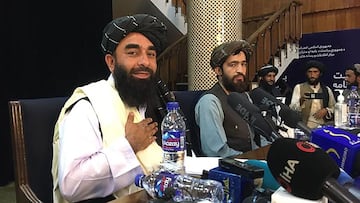What did the Taliban say in their first press conference after the fall of Kabul?
The groups' leaders have arrived in Kabul and have been briefing the world's media about their plans for the future of Afghanistan.


Taliban spokesperson Zabihullah Mujahid began the press conference on Tuesday afternoon by announcing, "after 20 years of struggle we have emancipated [the country] and expelled foreigners".
"This is a proud moment for the whole nation," he says.
Asked a question about what the future of the country will be, Mujahid said it will be an Islamic nation, but he added, "When it comes to experience and maturity and vision, of course there is a huge difference between us now and 20 years ago." The spokesman went to explain that over the last two decades, the expertise of the group has grown in a variety of ways and that they hope those skills can be applied as they establish a new government.
The press conference is set against the backdrop of chaos in Kabul and the imminent arrival of Taliban political leaders from abroad. Mullah Baradar, the chief of the Taliban political office and one of its co-founders, has arrived in Kandahar as the government begins to be set up.
What did the Taliban say in the press conference?
The press conference began with a statement from the group who made it clear that many questions relating to law, structure, and policy will be left up to those tasked with the creation of the new government. However, those present did make it clear to the media that the new government would be "Islamic."
Then, the group took questions from domestic and international media outlets relating to the role of women and girls, the safety of those who worked with the US and coalition forces, the group's relationship to Al-Qaeda, and how they plan to slow the production and trafficking of drugs.
While what was said sounded promising, it will take time to see if the group will live up to its promise of peace.
On the forming of a new government
"We need to wait... we want to reassure that we just need some time," Mujahid said.
People saying that the 20 year US/UK war in Afghanistan achieved nothing are wrong.
— Aaron Bastani (@AaronBastani) August 12, 2021
It catalysed a massive surge in domestic opium production. pic.twitter.com/070LHmOdmY
"We want good relations with all neighbors... we are trying our best that our relationships with our neighbors are based on international and Islamic law."
"We want a government where everyone is involved. We don't want war, we want peace and stability."
Mujahid said that the Taliban will crack down on the drugs trade, which was previously banned under their rule. Opium production has risen massively in the last 20 years, and Afghanistan is one of the biggest opium producers in the world.
On a free press in Afghanistan
"We are committed to the media within our cultural framework," Mujahid said.
"Nothing should be against Islamic values when it comes to the activities of the media," he added. Already, radio programs have reported being banned from playing pop music and only being permitted to play religious music and adverts. Women were briefly taken off of television air but reappeared on the news on Tuesday.
"You in the media should pay attention to [our] shortcomings, so we can serve the nation, but the media should not work against us."
On the Taliban approach to Afghanistan's women
After questions from the international press, Mujahid said the group were, "committed to the rights of women under the system of sharia law."
"They are going to be working shoulder to shoulder with us. We would like to assure the international community that there will be no discrimination."
This is unlikely to reassure women of their role in the country, as the previous Taliban government also considered themselves justified in their discrimination of women under sharia law. However, the group said women will be allowed to work, "within the frameworks [of sharia]."
In a further question about women's role in journalism, Mujahid said people will, "need to wait until the government is formed," before people know all the roles women will have in the new state.
On Afghans who fought or worked with the US and NATO
"I want to reassure all our countrymen, whoever has worked in the military, in translation, we have given amnesty to everybody, there is no revenge," Mujahid said in response to a question on how the Taliban will treat those who have fought them.
He continued, "All those young people who have talent and who have got education, we want them to be here and work for Afghanistan, for their own country. No-one will go after them, no one will ask them why they worked with the Americans."
Related stories
"There is no danger for them."
Despite these comments, Afghans have been hiding in their homes in case they are caught by the patrolling militia of the Taliban. The next weeks and months will show how much the Taliban stick to their statements or what the euphemism of a "framework," will actually entail.